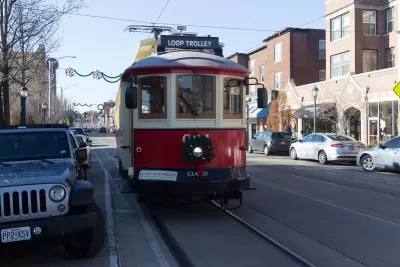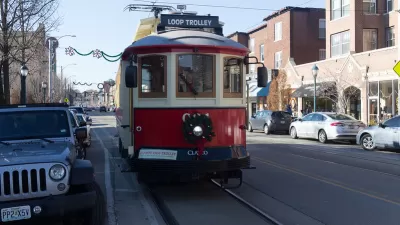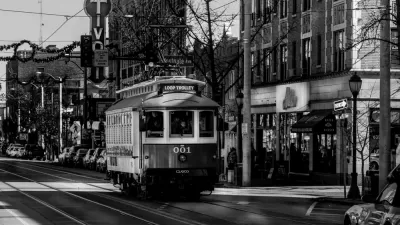St. Louis faces losing federal funds if the Loop Trolley remains defunct. But is the 2.2-mile line worth it?

According to Tony Nipert, "the Federal Transit Administration (FTA) warned St. Louis that it needed to forge a plan to jumpstart the Loop Trolley by June 1st or pay back the federal grant money allocated to the project." The 2.2-mile trolley line, which opened in November 2018, garnered criticism during its tenure and was shut down in December 2019.
As Nipert writes, the city has three options. One is to remove the trolley line altogether, an option supported by many who see it as a sunk cost but that others argue would harm future potential funding. The second choice would be to expand the trolley's reach to serve more tourist locations in Forest Park. While the line may never become a robust part of the city's transit network, it could at least become a more useful and well-used tourism asset.
The third option, according to Nipert, is to operate the trolley long enough to receive the federal grant funding, then reassess. This approach, supported by St. Louis mayor Tishaura Jones, could afford the trolley "a chance to build a reputation based on its service and utility to patrons" and buy time for the line to potentially become financially self-sustaining.
While the trolley could still fail to meet residents' needs, Nipert argues that reopening it for the duration of the grant could give it a chance to thrive.
FULL STORY: WHAT TO DO WITH THE LOOP TROLLEY?

Planetizen Federal Action Tracker
A weekly monitor of how Trump’s orders and actions are impacting planners and planning in America.

Congressman Proposes Bill to Rename DC Metro “Trump Train”
The Make Autorail Great Again Act would withhold federal funding to the system until the Washington Metropolitan Area Transit Authority (WMATA), rebrands as the Washington Metropolitan Authority for Greater Access (WMAGA).

The Simple Legislative Tool Transforming Vacant Downtowns
In California, Michigan and Georgia, an easy win is bringing dollars — and delight — back to city centers.

The States Losing Rural Delivery Rooms at an Alarming Pace
In some states, as few as 9% of rural hospitals still deliver babies. As a result, rising pre-term births, no adequate pre-term care and harrowing close calls are a growing reality.

The Small South Asian Republic Going all in on EVs
Thanks to one simple policy change less than five years ago, 65% of new cars in this Himalayan country are now electric.

DC Backpedals on Bike Lane Protection, Swaps Barriers for Paint
Citing aesthetic concerns, the city is removing the concrete barriers and flexposts that once separated Arizona Avenue cyclists from motor vehicles.
Urban Design for Planners 1: Software Tools
This six-course series explores essential urban design concepts using open source software and equips planners with the tools they need to participate fully in the urban design process.
Planning for Universal Design
Learn the tools for implementing Universal Design in planning regulations.
Smith Gee Studio
City of Charlotte
City of Camden Redevelopment Agency
City of Astoria
Transportation Research & Education Center (TREC) at Portland State University
US High Speed Rail Association
City of Camden Redevelopment Agency
Municipality of Princeton (NJ)





























